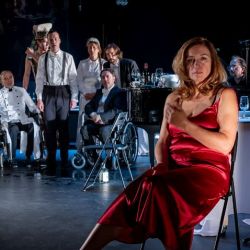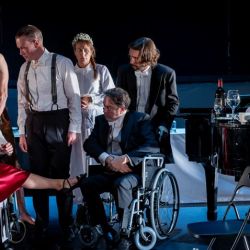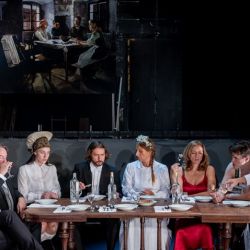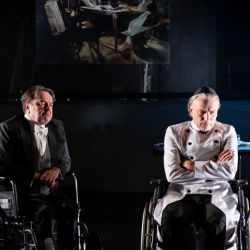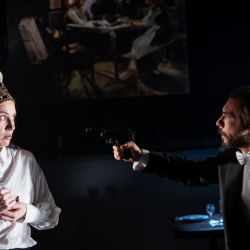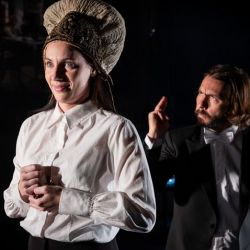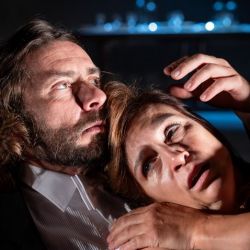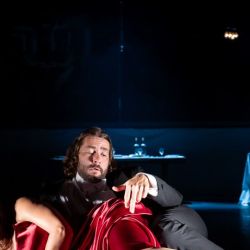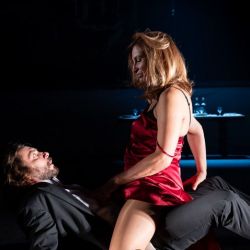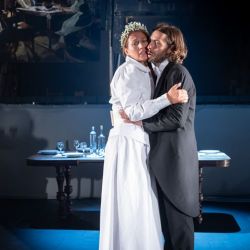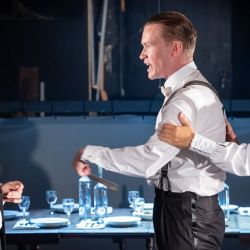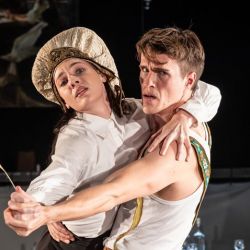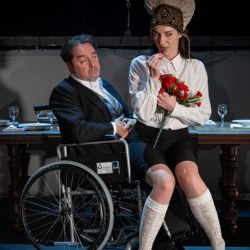With his work and ideas, Bratko Kreft (1905-1996) had a profound influence on Slovenian art and culture. He was a versatile and multi-talented artist and intellectual ̶ director, dramaturg, playwright, theatre scholar, fiction author, essayist, professor, literary historian, philosopher. He believed in the power and mission of theatre. As early as the 1930/31 season he began working at the then Slovenian National Theatre as a stage director; after the Second World War he was rehired in April 1946 at the then renamed Slovenian National Theatre Drama Ljubljana as a dramaturg, and later also as a director. He included thought-provoking texts, both classical and contemporary, into the repertoire. In 1948, he received his first Prešeren Fund Award for his rewriting and staging of Tugomer, followed by his second Prešeren Fund Award in 1957 for his staging of Shakespeare's Henry IV, and finally, the Prešeren Award for Lifetime Achievement in Literary and Theatre Arts in 1975.
He authored more than ten plays, some of which were left unfinished. In terms of style, he was an adherent of social realism. The Counts of Celje, his first play, is a drama about the life of the medieval feudal lords. It was followed by a bitter satire, The Creatures, and a historical chronicle The Great Uprising. His final play, The Comedians of Carniola, is a gracious comedy. With his undisguised and revolutionary stance, he drew on history and depicted his present time, which is why his plots are striking metaphors for chaotic modernity. With his plays, Kreft founded social realism and gave it a non-compromising critical slant. Along these lines, he also appended and expanded Tugomer by Jurčič and Levstík, in the historical style and spirit of his time.
In The Comedians of Carniola (1946), often considered the most endearing Slovenian comedy, Kreft drew on Linhart’s Micka, the Mayor’s Daughter, and on This Merry Day, or Matiček’s Wedding, written in 1780s. Kreft succeeded in answering the eternal question of Matiček and Micka’s authorship. His is a skillfully composed and imaginative comedy, intertwining real and fictional events of 1789, the year in which Linhart’s Micka, The Mayor's Daughter, the first genuine folk play in Slovenia, premiered at the Ljubljana Estates Theatre. It is a vibrant portrayal of the atmosphere at that historical moment. Written in the language of Linhart’s time in the Rococo manner, The Comedians of Carniola is an exploration of the cultural hotbed and intellectuals of Ljubljana in their struggle for the Slovenian language and theatre. This delightful comedy uncovers many a layer in the awakening of an individual and a nation, their strength, courage, as well as madness and mischief.
“The Comedians of Carniola is a harsh critique and a polemical political farce; this reconstruction of historical events in the formation of Slovenian theatre and language is an evocative situational as well as a brilliant character comedy. Kreft’s up-front national-awakening and constitutive stance, which alone could, boldly and courageously, overcome the misunderstandings, provocations and even the outright hate that Slovenians have always been subjected to in subordinate positions within the states and systems in which they were forced to live and act, disaffected and unrecognized. The play is a hymnic resurrection of the arts-and-culture primordial moment of Slovenian identification. Moreover, Kreft, discusses the true origin of our autonomy and self-awareness. The play is a reminder to all of us; it shows the scope of strength and necessity of efforts exerted by certain individuals of the Slovenian nation to establish our political independence, respect of human rights and liberties, and above all, it shows what was needed to achieve full sovereignty, instituted in particular by the assertion of our language.”
Diego de Brea, director
Director, set designer and lighting designer Diego de Brea
Costume designer Simona Toš
Composer Joži Šalej
Language consultant Živa Čebulj
Cast
Anton Tomaž Linhart Andrej Murenc
Baron Žiga Zois Renato Jenček
Juri Japel Rastko Krošl
Jožefina Linhartovka Tanja Potočnik
Matiček Urban Kuntarič
Micka, Zois' Housekeeper Maša Grošelj
Suzana Barbara Medvešček
Count Hohenwart Of Gentle Birth Žan Brelih Hatunić
Characters in Micka, The Mayor's Daughter
Noble Tulpenheim Anton Tomaž Linhart
Lord Mayor Jaka Baron Žiga Zois
Micka, The Mayor's Daughter Jožefina Linhartovka
Anže, Micka's Bridegroom Matiček
Lady Šternfeld Suzana
Noble Tulpenheim's and Lord Mayor Jaka's Voice Urban Kuntarič
Micka's, Anže's and Lady Šternfeld's voice Žan Brelih Hatunić
Musician
Piano, accordion Joži Šalej
Opening 27 September 2024
Performance duration: 1 hour and 45 minutes. No interval.
Zither Peter Napret
The music was recorded by Blaž Celarec.
Music used in the production includes Slovenian and Austrian folk music and a motif from the film La dolce vita by composer Nino Rota
A digital image of the original painting At Home by Jožef Petkovšek, 1889, oil on canvas, 121,5 x 134 cm, inv. no.: NG S 305, owned by the National Gallery of Slovenia, is used in the production.
PHOTO: © National Gallery, Ljubljana
Stage managers Anže Čater, Zvezdana Kroflič Štrakl • Prompter Simona Krošl • Lighting master Amadej Canjuga • Sound master Mitja Švener • Property master Manja Vadla • Front-of-house Matej Karlovšek • Make-up artist and hairdresser Andreja Veselak Pavlič • Hairdresser Sibila Senica • Wardrobe masters Suzana Pučnik, Maja Zimšek • Tailor Anita Kragelj • Seamstress Ivica Vodovnik • Head of construction Gregor Prah • Technical manager Aleksandra Štern • Assistant technical manager Rajnhold Jelen


